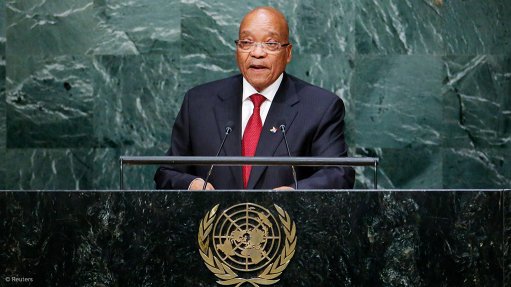
President Jacob Zuma
Photo by: Reuters
Collective global action against all forms of terrorism under the auspices of the United Nations is imperative, but addressing the root causes of terrorism is also critical, President Jacob Zuma said on Sunday.
“We must establish good governance, support overall sustainable development, safeguard the protection of human rights, and ensure that any military actions are conducted strictly in accordance with international law, under United Nations Security Council mandates,” he told a working dinner of G20 leaders in Antalya, Turkey, on the topic “Global Challenges: Terrorism and Refugee Crisis”.
The painful human tragedy of the current refugee crisis into Europe had highlighted the need to find lasting solutions, and it should be recognised that as long as there was conflict in the world, refugees would be a reality to contend with.
South Africa reiterated the call to European Union leaders to respond urgently and as a region with a common, comprehensive, and sustainable policy with the focus on sharing responsibility among its members, while addressing the problems in the sending countries, pledging support as necessary, he said.
The most prevalent cause of the current trend of terrorism and the breeding ground for violent extremism was primarily the result of unabated war and conflict in a region where, for a very long time, there had been a preference for military action instead of political solutions.
Other factors, including socio-economic ones, interference by outside parties, and the pursuance of the regime change doctrine had also played a significant role in perpetuating the ongoing cycle of conflict and instability.
“The lack of progress on political dialogue and the absence of a sustainable long-term solution have created the space for terrorist groups such as ISIS, Al-Qaeda, and the others associated with them to exploit divisions for the furtherance of their distorted beliefs.
“As terrorism and violent extremism spreads, the international community must reflect on and adapt its response, because it is clear that our actions thus far have fallen short of what is required,” Zuma said.
Terrorism and violent extremism continued to kill and maim innocent people, damage property and infrastructure, foster fear in local communities, undermine social and economic confidence, and, in many cases, entrench the forces of poverty.
The international community had to also redouble its efforts in the Middle East to promote conditions for inclusive dialogue aimed at achieving sustainable political solutions to the conflicts in the region.
South Africa remained firm in its condemnation of terrorism and had pledged its support for countering this threat within the framework of the UN. South Africa was also supportive of efforts within the UN system to promote dialogue, peace, security, and understanding. The importance of dialogue to resolve conflict could not be underestimated, he said.
Zuma echoed sentiments expressed by others, saying the discussion on terrorism should not be conflated with the refugee crisis, especially given the very real complexities underlying their respective root causes.
“We should be careful to ensure that the messages we convey to the world are not misunderstood. Put frankly, not every refugee is a terrorist.
“We must avoid this type of labelling or inter-linkages due to the negative and undesirable consequence that could result,” he said.